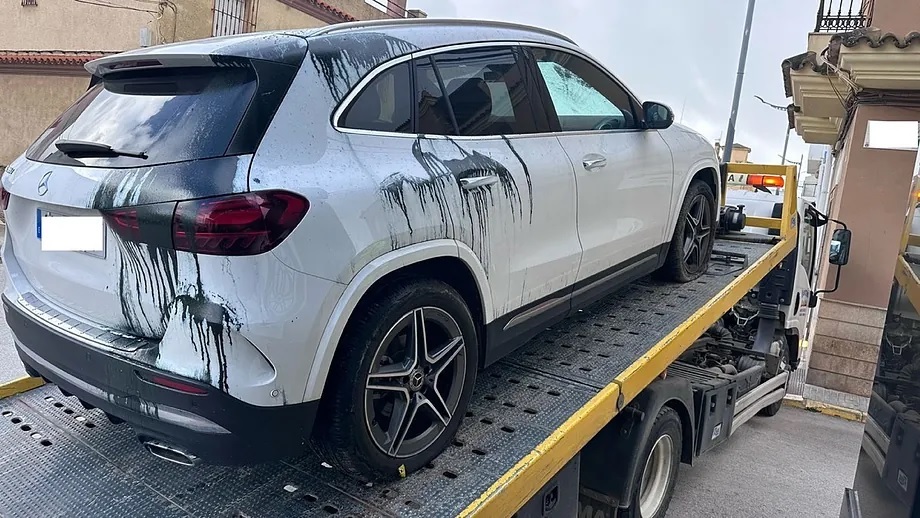The attack on the judge's car who sent El Cabra and his gang to prison for the murders of the two civil guards in the port of Barbate in February 2024 is a continuation of the situation experienced by the upholders of the law -civil guards, police officers, judges, and prosecutors- on the coast of Cádiz and in the Campo de Gibraltar. The incident has an added level of seriousness and symbolism because, apart from the damage to the vehicle, the vandalism occurred at the door of her house, where it was parked. In other words, the perpetrators of the attack know where she lives, and this act can be interpreted as a warning. Acting as a substitute judge, Maria Eulalia Chanfreut faced an unprecedented event: the deadly ramming of a narco-speedboat into the Civil Guard's zodiac boat that was trying to get her to leave the port facility.
The Civil Guard pointed to El Cabra and five other men, she imprisoned them, although months later she corrected the mistake and arrested Karim El Baqqali, alias El Enfadao, as the person driving the narco-speedboat. Chanfreut reported to the Civil Guard the vandalism of her vehicle, parked at the door of her private residence, on March 8. It had all four tires punctured, paint had been sprayed on both the hood and the roof and sides, and the rear symbol of the manufacturer's brand had been stolen.
Another identical incident that occurred on December 19 -and unknown until now- illustrates the harassment and attacks that police officers and civil guards suffer from drug mafias. The car of one of the leaders of the Civil Guard in the fight against drug trafficking was found completely burned at the door of his home. Just like in the case of the magistrate, it was also interpreted as a warning.
The hand of drug trafficking clans not only targets those who combat them but also extends pressure to their families, so many officers choose to seek other destinations, making their positions temporary and not permanent. In recent times, the Campo de Gibraltar has been the scene of high-profile pursuits, drug seizures in broad daylight, and even the assault on a hospital to free a detained trafficker.
The succession of negative descriptions about the region of Spain that drive away police officers and civil guards is devastating. The major drug families have taken control of everything, "they are comfortable," and even possess war weapons to protect their drug shipments when they reach the coast in broad daylight. With total impunity. Officers and their families work and live under constant pressure from the environment that supports or works for the traffickers.
Many of the officers have chosen to live in other towns away from their workplace to avoid reprisals. Attacks on members of the Security Forces are commonplace. "During operations, officers are recorded to expose their information on social media, encouraging harassment of their families." The same happens with judges and prosecutors.
La Línea de la Concepción, Algeciras, and Tarifa have become a punishment for police officers and civil guards. No one wants to work there. This is evidenced by the fact that, year after year, over 40% of the police force requests a transfer. The issue is that officers do not manage to settle in an area where having consolidated teams is essential to effectively address the tremendous problem it faces, a problem that the Ministry of the Interior has yet to tackle comprehensively and decisively, as reported.
Police officers and civil guards once again demand that Minister Fernando Grande-Marlaska urgently declare the Campo de Gibraltar as a Zone of Special Singularity (ZES) due to the harshness of the assignment. The government continues to ignore this request, which has almost become a plea. These circumstances take those fighting against drugs in the area back to September 2022. The Interior Ministry decided to do away with the Southern Narcotrafficking Coordination Agency (OCON) -comprising 130 agents specialized in combating drug trafficking and related activities such as money laundering, organized crime, and corruption- despite having significantly impacted arrest and seizure statistics since its establishment. It was a group on standby 24/7 that, as one of the Campo de Gibraltar commanders recalls, "kept drug trafficking so much in check that things changed." The drug clans in the area feared it, conducted surveillance on it, and when, against all odds, it was dismantled, they celebrated its departure.
Since then, according to a Civil Guard member part of an anti-drug team, there is a noticeable lack of control. "There is no longer any control, drug influx has increased. Now there are many fights among traffickers, kidnappings among them. The situation continues to worsen." The judiciary also reacts to the attack on the judge: "These events cause deep concern in the judiciary. It is essential that we have personal and material guarantees to protect us."
